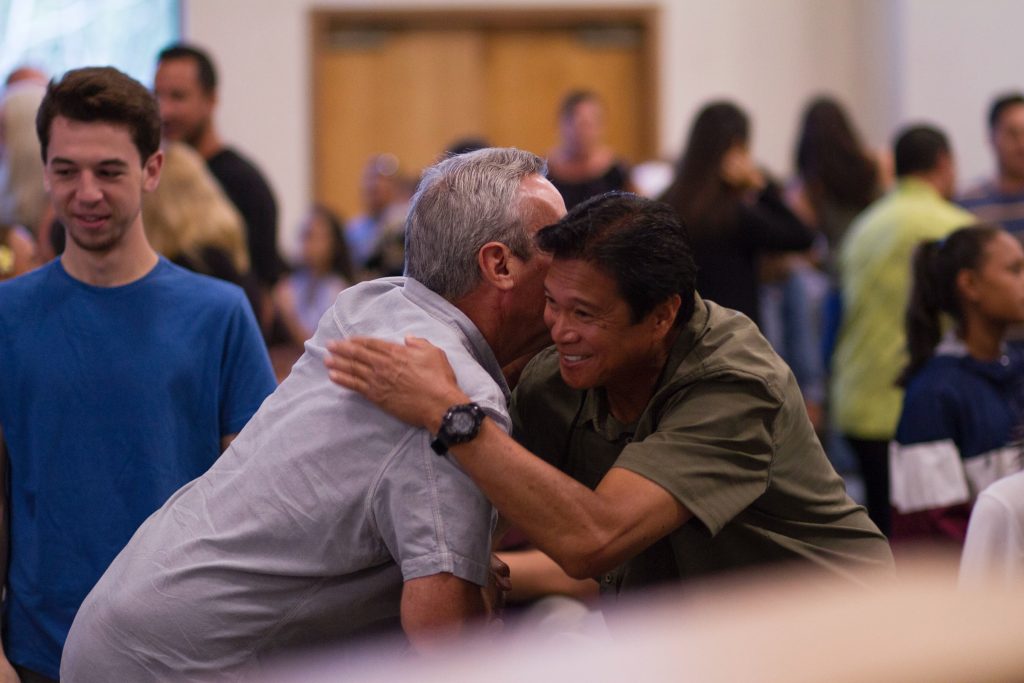So many times in ministry, I have had people in the midst of life and in the midst of crisis tell me that they don’t know if they have the strength to carry on.
I remember once, many years ago, a woman who was actively caring for her a severely disabled son sat in tears before me, essentially telling me that she was at her breaking point. She recounted how worn out she was. She told me how much she cried. She told me how much it hurt watching her son, whom she adored, suffer so senselessly. She was emotionally broken. She was physically exhausted.
I didn’t know what to say.
The truth is that I had no idea what she was going through. I didn’t have a child at that point in my life. I had not experienced nearly as much of life as she had. I could barely imagine her reality or the emotional pain or physical exhaustion that she must have been suffering through. I was ill equipped to pastor her. All I could do was be present. So I just listened. She needed to talk. She needed to vent. She wept and she grieved.
Then she said, “Don’t tell me that God doesn’t give people more than they can handle. It’s simply not true.”
I distinctly remember thinking in that moment, “That isn’t Scriptural. Of course I wouldn’t say that!”
What I did say was something to the effect of, “I can’t say if God has given you this situation–I don’t believe he has–but what I can assure you is that God will get you through it. And I can say that confidently, because while you might not feel this way, from my perspective, you are doing and incredible job of being a mother.”
And she was. I am convinced that no one will ever really know the depths of the heartache that she was going through, but from the average person’s perspective, she and her husband were doing an incredible job.
The Scripture passage that she was referring to when she said “God doesn’t give people more than they can handle” is actually a passage that people take out of context all the time, 1 Corinthians 10:13. In that passage, the apostle Paul is referencing the everyday temptations that folks in the Corinthian church faced while living in Corinth. Corinth was essentially a cosmopolitan two-port Greek town shaped by Roman influence, full of people from different places and backgrounds who weren’t Jews or Christians.
Paul knew that the adherents in the Corinthian church had access to all sorts of temptation: idolatry, drunkenness, and local temple prostitutes. So when he says in 1 Corinthians 13, “God is faithful, and he will not let you be tested beyond your strength, but with the testing he will also provide the way out so that you may be able to endure it…” he’s talking about temptation towards sin.
Unfortunately, because people love to quote the Bible for their own purposes as opposed to actually reading and seeking understanding from the text, we often tend to use Scripture as a weapon, even unintentionally, against one another.
I am sure someone was trying to comfort the woman by saying, “God doesn’t give people more than they can handle,” but in truth, what they ended up insinuating was that God created her situation and simultaneously didn’t seem to acknowledge how difficult it is.
I think society mischaracterizes God in this way all of the time. We assume that because God is God, our problems are no big deal to him. But that simply isn’t what the Bible says.
The Scriptures tell us that Jesus is God incarnate. And in John 12:27, Jesus says to God the Father: “Now my soul is troubled.” Paul says more about this in Hebrews 5:7, when he says that “In the days of his flesh, Jesus offered up prayers and supplications, with loud cries and tears.” Moreover, in Luke 22:44, we read that when Jesus is in Gethsemane, his anguish is so intense that his sweat becomes like blood.
The suffering that Jesus was about to endure in order to conquer death and begin a the redemptive process in the world—a process that you and I are called to participate in—was so intense that Jesus, knowing what was coming, says in Luke 22:42, “Father, if you are willing, remove this cup from me.”
If anyone understands the difficulty of suffering, it is God. God the Son endured such suffering for us. At the same time, when I think back to that tired woman, exhausted in grief for what her son was suffering through, I can’t help but think that while I as a vocationally green pastor may have struggled to relate to her plight, if anyone could relate to the suffering that she was enduring, it was God, the great heavenly parent who also endured his son’s suffering.
And this needs to be pointed out because, at a very fundamental level, it means that in our suffering, we are not alone. Because of God’s great love for us, God doesn’t dismiss our grief as something simply to get over. God instead meets us amidst our grief and stays by our side as we traverse it in order to help to transform our pain and brokenness into our strength.
This is important, because “Silent Suffering” is something that people throughout the world are going through all the time. And when it happens to us, it feels like we are all alone with this grief.

I don’t know about you, but there have been times in my life where I didn’t know how I was going to make it. I was anxious. I was stressed out to the point where my pulse was elevated and my blood pressure was 20 points higher. I could not see the path ahead. I was afraid of what might come. And even though I have loved ones, even though I know that there are people who care about me, I felt isolated. I felt alone.
Yet, somehow in those moments, beyond my own understanding and my own explanation, beyond my own capabilities, God continued see me through.
The strange thing that hindsight can show us is that while we are in the midst of what we consider to be our worst moments in life, those moments can sometimes create the environment that helps us to blossom into what we are to become.
But it doesn’t mean that we don’t endure trauma. We do. Sometimes, it is so pronounced that it crushes us. Sometimes, our trauma impacts our physical and emotional health. Sometimes, we have trauma and we don’t even know that it is happening to us.
I was sharing with some people this week that one night recently, I had a dream where the whole dream was about shaking hands. There were people from my present and my past—all in narthexes of churches that I have served throughout ministry that were somehow all linked together. And as I went through this connection of narthexes, almost like a giant hall, I saw faces of people whom I have known throughout my life. Some from churches I’ve served, some who may have never set foot in a church. The whole dream consisted of me shaking hands with people, hugging people, laughing, and telling stories.
I don’t know if the dream lasted seven seconds or seven hours, but I wanted it to go on and on. I was enjoying so much of the fellowship that when I woke up, I was suddenly and oddly saddened that it wasn’t still happening and that I had dreamed it. Yet I was simultaneously thankful for all of the wonderful people—the great cloud of witnesses of humanity—that I have had the privilege to meet throughout my life.
The whole thought of that interaction warms my heart and makes me smile. But still, I recognize that I had that dream and that at some very fundamental level, it emerged from my psyche because I have been deeply, almost subconsciously traumatized—because I so deeply miss that weekly, in-person interaction with my church family.
This year has taken a toll on me in some ways, many of which I probably have yet to realize.

I don’t know when the next time will be that I will be able to safely shake someone’s hand or hug someone again after a church service. I don’t know when we will meet again in person. Actually, the lists of “I don’t know’s” are, as they usually are, longer that the lists of “I do knows.”
But what I suspect is that I am not the only one who feels this grief.
I don’t name it to say that one thing or another should be done in practice; I name it simply to acknowledge its presence in this moment and to say that life is like this. Time goes by, and we are constantly being impacted at deep levels that we don’t always reflect upon properly, or take the time to acknowledge, much less fully understand.
Show me a person who has everything in life figured out, and you’ve likely just pointed out a person who hasn’t been on much of a spiritual journey.
I don’t profess to know how to address every situation of grief and trauma that you may have undergone in life, but, from my experience, what I can say is that through all of my grief, when I’ve taken the time to look for him, God has been with me. And, if I may be so bold, I would contend that if you dare to look, you’ll see God there with you as well.
The woman who cared for her disabled child… Well, many years later, her child went home to be with the Lord. The whole scenario was challenging and difficult from day one to the very last day. But, I know with certainty—as clearly as I know anything—that ultimately, she never regretted one day of service to her child. Today, she cherishes those trials as joys. What was once unthinkably difficult has surely become a crowning achievement of her life.
In a very similar way, Jesus would press on and go to the cross, with his heavenly parent surely lamenting all the way. And yet, I believe—as clearly as I believe anything—that ultimately, Jesus and the Father never once regretted their service to us. What was once unthinkably difficult is now the crowning achievement of an ever-growing and ever-emerging Heavenly Kingdom. And it is also the foundation of a promise that one day, like that mother with her child, we will be all reunited together with God in Christ once again.
For me, that gives me hope. Hope that the loving Christ, who understands suffering, is willing to suffer with and for us. Hope that the suffering that we undergo for others will one day be the most revered aspects of our personhood. Hope that our present suffering, our lament, and our unknown traumas will be comforted and resolved in permanent ways. Hope that one day, in this life and the next, we will be reunited again in person.
This is the hope that I have in Christ. It is a hope that I pray that you share with me.
Reality Changing Observations:
1. Has anyone ever told you that God would not give you more pain or trial than you could handle? What did it feel like to hear that?
2. What does it mean for us that our God is a God who suffers?
3. Who in your life could use some comfort and encouragement? How could you remind them that God is with us in suffering?





